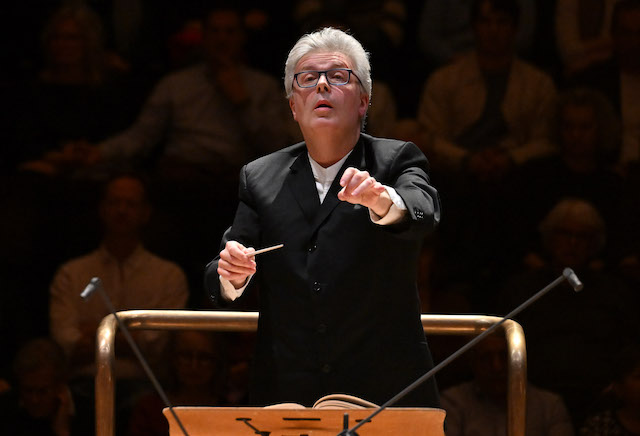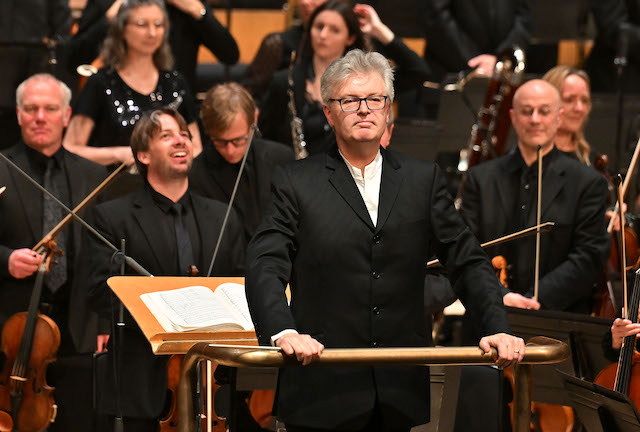It began with the tolling of a lone bell and ended in a transcendent blaze of golden light. The UK premiere of James MacMillan’s Fiat Lux – first performed in Los Angeles in 2023 to mark the dedication of the dazzling crystalline Christ Cathedral, formerly a televangelist backdrop, as a Catholic church – was as exhilarating as it was meditative, an iridescent exploration of spirituality and sound.
James MacMillan – who during the concert was awarded with an Ivors Academy Fellowship to mark his status as one of our most successful living composers – conducted the BBC Symphony Orchestra himself in an evening that felt both radical and illuminating. The programme began with Arvo Pärt’s Cantus in Memory of Benjamin Britten, a canon in A minor written for string orchestra and bell in 1977, the year after Britten died.
After the first chiming of the bell, whispering violins subtly amplified the refracted sound. The deceptively simple repetition of descending passages – heightened by mournful cellos – built up layers of echoes and unexpected harmonies which steadily increased in intensity. The repeated chime of the bell evoked a church on an island in the middle of a lake, made more solitary by the shifting elements. Sometimes the strings’ vibrato suggested the shimmering of light on water at others the agitated depths below. 
From here MacMillan swept the orchestra into the whirlwind of the Dies Irae, with its magnificent macabre energy first evoked by the frantic skittering of strings and adrenaline spikes of alarm from the flutes. The deliberately jerky orchestration of the brass and drums heightened the sense of a cataclysmic energy, an opening up of the graves to reveal unimagined terrors. Then the flutes introduced the beatific calm of the Requiem Aeternam, with a piercing melancholy that contrasted with the resonant brass. Gradually the piece built to a white heat, with swirling flourishes on the harps and blasts of sound from the horns and cymbals seeming to raise us into a different dimension before it died down, ending on a single clarinet note.
After the interval, MacMillan took us into the sound world of Finnish composer Einojuhani Rautavaara’s Into the Heart of Light Canto V, first performed in in 2012. This work, purely for string orchestra, is meant to evoke the way that the creative process goes from the watery depths of confusion to revelation and light. The swirling chaos at the start was accompanied by a sense of shuddering dread before escalating melodies started the ascent. When we finally reached the light, it had the subtlety of reflections on ice, shimmering and multi-hued until the moment at the end when a bittersweet cello solo played us out into the darkness once more.
Finally came the moment most of the audience had been waiting for, the first performance in England of MacMillan’s work based on a poem by the Californian poet Dana Gioia. It began with a woosh of ethereal noise as the string section swept their bows across their strings to create a gossamer effect that was subtly amplified by wind echoing through the brass instruments. Then a lone horn sounded, gradually joined by other horns in the build-up to the entrance of the two soloists of the evening, baritone Roderick Williams and soprano Mary Bevan. 
Yet rather than blasting us with sound, MacMillan brilliantly chose to make this a moment of understated serenity. The united voices of the choir were shadowy and muted, blending in with the quietly accompanying orchestra. As in the other pieces of the evening, the dynamic built slowly from tenebrous depths to a sense of spiritual translucence. Here it came with a suggestion of wonder that, rather like William Blake’s, evoked his sense of the infinite miracles both of his own world and other worlds beyond it.
At points it was poignantly introspective at others, brass, drums and the organ combined to make it as thrilling as being at the heart of a storm. By the end it felt as if we were surrounded by angels from Milton’s Paradise Lost, chorusing “Amen” as the orchestra brought the piece to its resonant ecstatic conclusion.














Add comment